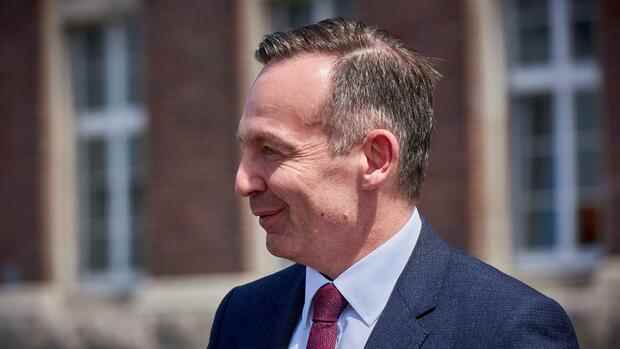Berlin Federal Digital Minister Volker Wissing is causing frustration in the federal states and in the telecommunications industry. The reason for this is the sluggish negotiations about a new funding program for nationwide fiber optic expansion. So far, the FDP politician has not been able to come up with a compromise that everyone can accept. Negotiations in a task force were broken off without result, a crisis talk at the level of the state secretaries showed that the proposals of the federal government were “unanimously rejected”, the federal states said. The federal states are therefore working out a counter-proposal.
By 2030, Wissing wants to provide all households with a fiber optic connection. Currently it is only 18 percent. By 2025 there should be at least three times as many. The network operators have announced that they will invest 50 billion euros by then. However, they warn against tying up the already scarce construction capacities for lengthy funding projects and thus slowing down broadband expansion.
Now the countries are going on the offensive. Mecklenburg-Western Pomerania has introduced an initiative to the Bundesrat, which will be put to the vote on Friday. There is broad agreement, it said on the part of the countries. In the application, the state demands that broadband expansion can continue to be promoted everywhere in the future and rejects a change in strategy. “It is absolutely necessary to ensure that restrictions on the funding framework are only made if there are binding expansion commitments from the telecommunications companies,” explained State Digital Minister Christian level (SPD). The federal states are meeting this Thursday to vote on their counter-proposal.
Top jobs of the day
Find the best jobs now and
be notified by email.
Rhineland-Palatinate, Minister Wissing’s home state, and Schleswig-Holstein have already joined the initiative. In the local FDP-led Ministry of Economic Affairs, dissatisfaction with the federal minister is high, it said. Bavaria also wants to agree to the initiative, as does Lower Saxony.
“As part of its gigabit strategy, the federal government presented the idea of prioritizing expansion projects nationwide according to the degree of undersupply and also distributing the funding accordingly,” saidleveel. “This would lead to a punishment of the states that – like us in Mecklenburg-Western Pomerania – have very successfully eliminated the underserved areas in which private-sector companies will not be expanding broadband in the foreseeable future.”
Countries seek a unified position
Bavaria’s Minister of Finance, Albert Füracker, argues in a similar way and refuses to rely primarily on private companies. “Bavaria is clearly against the current plans to realign federal funding,” said the CSU politician to the Handelsblatt. Changes would only delay expansion. “Our municipalities now need support with fiber optic expansion – without tranches, without a first-come-served principle or prioritization, but above all without more bureaucracy.”
Lower Saxony’s Economics Minister Bernd Althusmann (CDU) relies heavily on the private sector. But he, like the other countries, is also sharply critical. “The forthcoming publication of the gigabit strategy should now be the first notable official act to scale back the previous ambitious goals and slow down the gigabit expansion by at least five years until 2030,” he warned. “That has nothing to do with progress.” The federal states would also reject the plan to set the minimum supply of people at just ten megabits per second, as Minister Wissing did by decree.
So far, municipalities in areas where there is still no connection of 100 megabits per second can carry out a market investigation process. If no company registers to expand the area, the municipality may advertise the subsidized expansion. The state of Hesse, on the other hand, supports the idea of the traffic light coalition in Berlin to classify development areas according to how great the potential for economic expansion is. The state should only be able to intervene where there is no perspective. This should give priority to private providers in the expansion. This is an important contribution to dovetailing private and subsidized expansion, explained the Hessian Digital Minister Kristina Sinemus (CDU).
Economy warns against missing the expansion targets
It is about eight million households that, according to an analysis by the Federal Digital Ministry, could be connected to the fiber optic network with funding. The federal government wants to support funding decisions for a maximum of two million connections per year. By the end of 2026, all uneconomic regions would be advertised. The federal government even wants to provide more than the funding amount previously capped at one billion euros by Minister Wissing.
“It is incomprehensible to us why the ministry obviously does not pursue the proposal put forward by Minister Wissing himself to limit the annually available funding,” criticized Sven Knapp, manager of the Federal Association of Broadband Communication (Breko), the development. A number of network operators belong to the association, including large regional providers such as EWE Tel, municipal providers such as Enercity, but also private providers such as DeutscheGlass fiber.
Knapp called for “a clear agenda” from Digital Minister Wissing. This must ensure “that state support measures do not crowd out the much faster self-sufficiency expansion”. For this reason, the development areas should be stretched over at least five years. “We will not achieve the goal of providing Germany with fiber optics nationwide by 2030 without a fundamental reform of the existing state funding for fiber optic expansion,” he warned.
More: Fiber optic disaster – How bad politics and sluggish companies endanger Germany’s digital future
